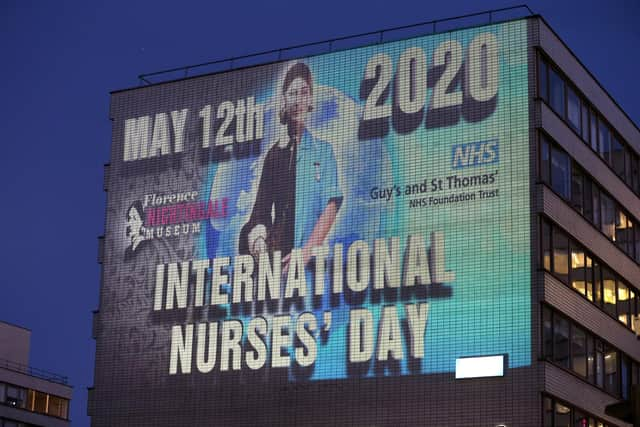Sheffield's links to famous healthcare pioneer Florence Nightingale
and live on Freeview channel 276
The date is commemorated annually as International Nurses’ Day, International Day for cfs/ME (chronic fatigue syndrome/myalgic encephalomyelitis) and also for Fibromyalgia.
This year as part of Sheffield ME and Fibromyalgia Group’s #MillionsMissing event, Carolyn Leary (the group’s chair) interviewed Ian Carey, a local nurse with a strong interest in the story of Florence Nightingale.
Advertisement
Hide AdAdvertisement
Hide AdFlorence is thought of as ‘the lady with the lamp’ who tended wounded soldiers during the Crimean War and watched over them daytime and evening.


However, Ian felt this does not do justice to the remarkable woman she was, particularly in the Victorian era.
“She was a campaigner, a data scientist, a public health nurse – she is clearly associated with nursing, and rightly so, but she developed the concept of trained people delivering nursing care,” he said.
At that time, nursing was looked down on by society, so much so that it was even compared to prostitution as a service.
Advertisement
Hide AdAdvertisement
Hide AdIan continued: “Florence was a fantastic organiser – she got the army organised.


“Her recording of data led her to conclude that if you were a soldier wounded on the battlefield, you were better staying there,” he said.
Any patient in the army hospital ran the risk of picking up many diseases as there was no sanitation or ventilation.
Florence helped the army to develop the policies and the training to implement them, and then transferred this practice to civilian life.
Advertisement
Hide AdAdvertisement
Hide AdSanitation did not exist in the army – human waste was dumped behind the hospitals.


She identified that effective waste disposal and clean running water was essential, alongside frequent hand-washing.
At that time bacteria were not fully understood, and viruses were not even recognised.
Florence saw that transmission was taking place between people and she made the life-saving observation that hand-washing was the most important thing to prevent this.
Advertisement
Hide AdAdvertisement
Hide AdIn 1860, Florence established the first professional nursing school in the world at St Thomas’s Hospital.
She founded London’s Nightingale School of Nursing which raised the reputation of nursing as a profession.
“I think we can say in Sheffield that she’s a local lass,” said Ian.
Born in Florence, she would spend most of her early life, and certainly most of her summers, at Lea Hurst in Matlock.
Advertisement
Hide AdAdvertisement
Hide AdShe was a frequent visitor to see her grandmother who lived at Tapton Hall (not the current Tapton Hall but on the same site) and would attend services at Sheffield Cathedral.
“I have often been round by the tram stop, thinking Florence Nightingale would have walked these streets, coming and going, which is truly remarkable, and sadly I don’t think this is recognised in Sheffield, and maybe it is time we did something about that,” said Ian.
Florence’s legacy includes not only her extensive use of data as evidence, but she used the pie chart and other visual representations of the data to present her findings.
In her most seminal work, which she wrote while bed-bound, she used what we would now call informatics – graphic representational diagrams – to show the transmission of infection and disease, which had a huge impact.
Advertisement
Hide AdAdvertisement
Hide AdA key achievement was her influence behind the 1875 Public Health Act which brought in effective sanitation to major towns and cities and gave control to local authorities.
Although she came from a very privileged background, Florence fought hard to see everyone gain the health benefits from clean drinking water and effective sewerage.
She was the first person to set up a triage system in the army, whereby soldiers were treated according to need and urgency, rather than according to rank.
The story goes that she took a hammer one night to the medical stores to access supplies needed by the soldiers that she had been denied which the officers kept under lock and key.
Advertisement
Hide AdAdvertisement
Hide AdShe is also reputed to have been fierce in her determination, insisting nurses washed their hands.
We believe she would be a proud defender of our current NHS.
At the age of 38 Florence became bed-bound and remained so for most of the rest of her life.
While it is widely acknowledged that she had some form of post-viral symptoms from a fever contracted in the Crimea, her diary documents widespread pain, fatigue and mental cloudiness for the next 40 or so years, symptoms we would now associate with ME.
Advertisement
Hide AdAdvertisement
Hide AdFlorence Nightingale’s relevance to the present day is striking. The hospitals built to support COVID-19 patients have all been named after her; the critical hygiene that makes a difference to people catching Covid-19 is hand-washing and increasing numbers of people are finding that their recovery from contracting Covid-19 is a long, slow and variable journey.
Sheffield ME and Fibromyalgia Group are preparing for the anticipated increase in inquiries as the autumn approaches from an estimated 1 in 20 people who have contracted Covid-19 and whose symptoms have not gone away after several months.
The group will be posting new resources for their website www.sheffieldmegroup.couk
You can contact the group by calling 0114 253 6700 or email [email protected]
By Carolyn Leary, with thanks to Ian Carey
A message from the Editor:
Advertisement
Hide AdAdvertisement
Hide AdThank you for reading this story on our website. While I have your attention, I also have an important request to make of you.
With the coronavirus lockdown having a major impact on many of our advertisers - and consequently the revenue we receive - we are more reliant than ever on you taking out a digital subscription.
Subscribe to The Star website and enjoy unlimited access to local news and information online and on our app. With a digital subscription, you can read more than 5 articles, see fewer ads, enjoy faster load times, and get access to exclusive newsletters and content.
Visit https://www.thestar.co.uk/subscriptions now to sign up.
Advertisement
Hide AdAdvertisement
Hide AdOur journalism costs money and we rely on advertising, print and digital revenues to help to support them. By supporting us, we are able to support you in providing trusted, fact-checked content for this website.
Thank you
Nancy Fielder, editor